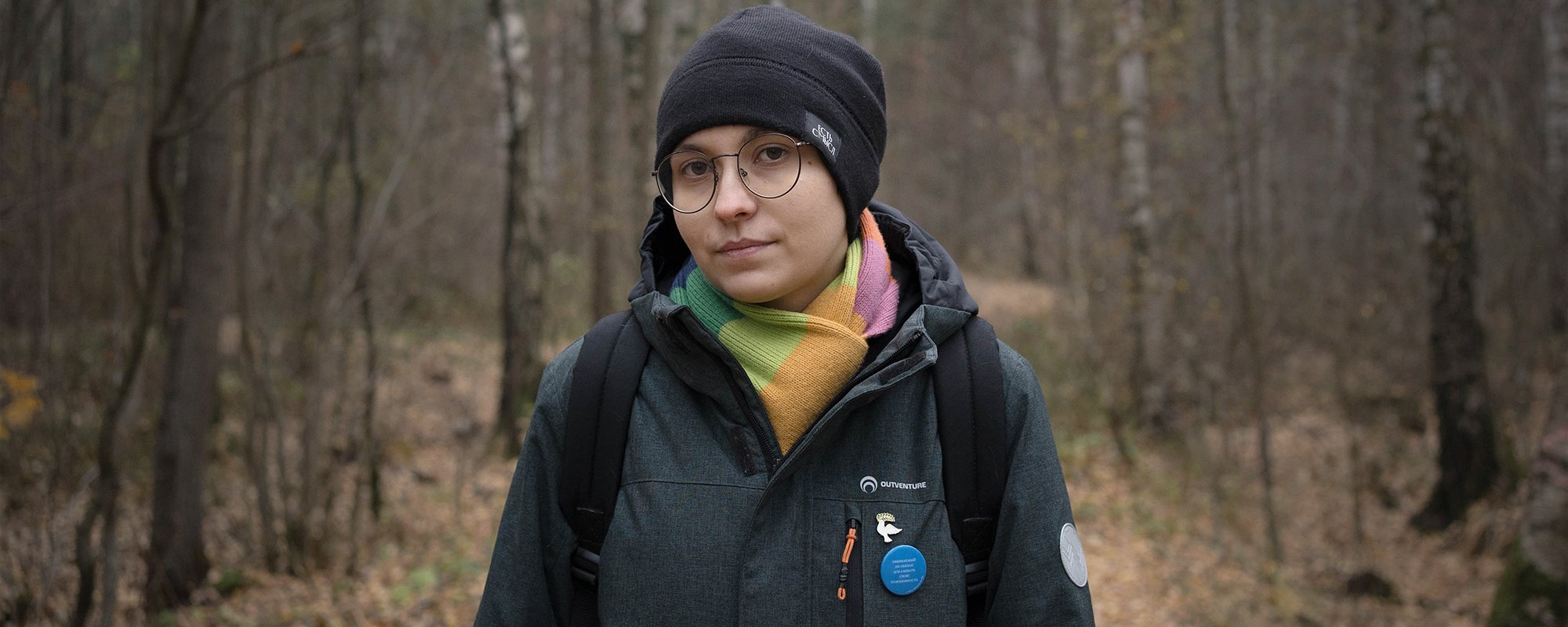Police officers from two districts of St. Petersburg have twice tried to prosecute local resident Tatyana Levicheva under the article of the Code of Administrative Offences on discrediting the Russian Armed Forces — and twice been defeated in court. Now Tatyana is suing the police officers back. During this time, one of the defendants in her lawsuit was himself charged in a criminal case about brothels, and the other was dismissed from the police for an «act unbecoming a law enforcement officer». Here’s how a green ribbon, handcuffs, and a wooden penis turned into a million-ruble court case.
Sleepless Nights on a Metal Chair
On the evening of May 10, 2022, Tatyana took part in the first springtime bike ride. She was bicycling through Sosnovka, a huge park in St. Petersburg’s Vyborgsky district. Passing a monument to military dog handlers, Levicheva tied a green ribbon on the bronze dog’s paw and put a sticker «Peace to the World» on the monument’s pedestal. «An emotional impulse came over me because I love dogs very much,» explained the St. Petersburg resident in an interview with The Village.
Suddenly, three people emerged from the darkness. According to the statement of claim filed by Levicheva (seen by OVD-Info), they «did not introduce themselves and did not explain what was going on». They removed the stick, threw out the ribbon, and «grabbed [Tatyana] and [took her] to the 36th Police Precinct» on Esenina Street. The time on the clock was 11:15 p.m.
At close to 2 a.m., Tatyana was taken back to Sosnovka — to inspect the «scene». «It’s night, the birds are singing. Nine policemen are walking around the monument [to military dog handlers] in search of a green ribbon. I’m standing there thinking: someone is being killed or robbed now, and here we are investigating the crime of the century,» she said.
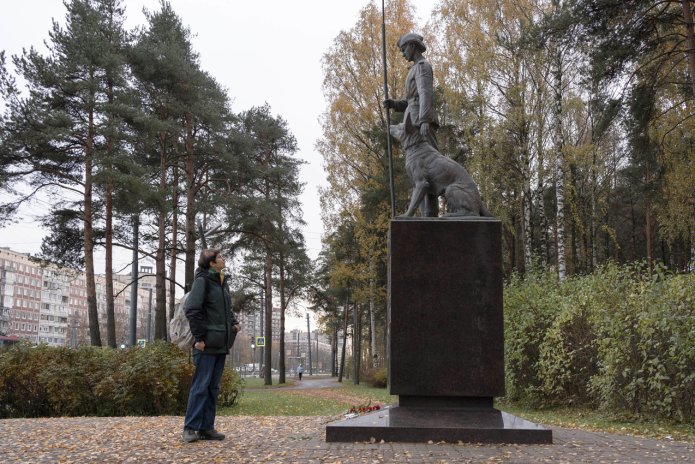
About an hour later, Levicheva was taken back to the 36th Police Precinct — and there, in a room behind the police station’s duty room, she was handcuffed to a metal chair. It was uncomfortable, and Tatyana slid down onto the bare concrete floor. Sleep was impossible: her eyes were blinded by the «bright nightmarish» glow of the fluorescent lights. «Furthermore, it was pretty humiliating to ask to go to the restroom,» Levicheva tells a correspondent of OVD-Info, adding that the room was a corridor and staff kept walking back and forth, but she was ignored.
There was a fingerprint scanner in the duty room itself. Junior Police Lieutenant Artur Medvedev roughly leaned Levicheva against the device and threatened that if she did not give her fingerprints, he would break her arm. Tatyana screamed. Her fingerprints were even taken twice — once on the scanner and also in ink. The St. Petersburg resident believes the law enforcement officers «were dreaming of finding some kind of criminal case» against her. The police officers called Levicheva a fascist, asking her: «You’re from St. Petersburg, you were born here. Didn’t anyone in your family die during the blockade? How can you be for the Ukrainian nationalists?»
At around 6 a.m., Tatyana was unshackled from the chair and led upstairs to the office of «some major» for a personal inspection of her belongings. They «cleaned out the backpack» and began creating a list. Levicheva was quietly happy that she could «sit on a normal chair,» and she took a look at her surroundings: «I see that on the wall there is a row of certificates: for good service, for accomplishing some sort of task, some sort of commendation. At the end of the row there is a „reindeer herder-elf certificate“. And next to it — a huge wooden penis. I sat there thinking „What even is happening here? It’s completely surreal."»
As late as 4:20 p.m. on May 11, 17 hours after her arrest, two administrative offence reports were drawn up against Levicheva. At that point, she had been handcuffed to a chair for almost 14 hours (with short breaks). If she hadn’t been sent food, she would have gone hungry — the policemen did not provide her with any food or water as required by law. The first report was for discrediting the army (Article 20.3.3 of the Code of Administrative Offences of the Russian Federation): the green ribbon was interpreted as a «Ukrainian nationalist protest symbol». The second report was for disorderly conduct (Article 20.1 of the Code of Administrative Offences): during the arrest in the empty Sosnovka, Tatyana was allegedly swearing in front of a large number of fellow citizens. As the latter article allows for arrest, the police were able to continue detaining her at the police precinct for one more night.
She wasn’t put in a cell, but in the same corridor behind the duty room, seated on the same metal chair. Levicheva asked one of the police officers if he could turn off the lights; he just laughed.
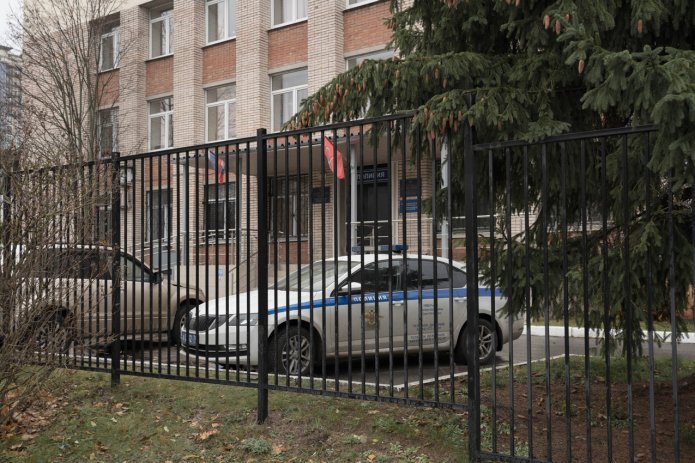
After two nights spent under fluorescent lights, the detainee was taken to the Viborgsky District Court of Saint-Petersburg on the morning of May 12. According to Levicheva, by that point she had an awful headache, and her eyes were hurting as well. Within a few hours, Judge Mamina dismissed the case due to insufficient evidence, and ordered the charge of discrediting the army dropped and her personal belongings returned: two bike lights, four badges, a marker, and three 100-ruble bills.
The next hearing — on the charge of disorderly conduct — was delayed, so Tatyana left the court building; and then she was approached again by police officers, different ones whom she did not recognize. They also «didn’t introduce themselves or explain what was going on». Putting Levicheva in a police car, they drove her to the opposite side of the city — to the 33rd Police Precinct of the Moscow district.
«An Article That Causes a Public Outcry»
Afterwards, law enforcement officers from that precinct would say that they were investigating a bomb threat received by email at 11:21 a.m. by the 9th Maternity Hospital (they would later drop the investigation into that case). Tatyana wrote out her refusal to answer questions and declined to have her fingerprints taken for a 3rd time. She considered the latter requirement «an outright mockery». In a future lawsuit, she would call her arrest «persecution» and «revenge» by law enforcement retaliating against the «incorrect» decision of the judge in the green ribbon case.
Around 6 p.m. she was released. Within an hour, another judge of the Viborgsk district court, Golovinova, dropped the second administrative case regarding disorderly conduct. Levicheva, at last, was free.
But, as it turned out, not for long. A few weeks later, on June 1, she was on her way to the dentist. «As I left the house and was going to the subway, someone’s hand came down on my left shoulder and I heard, „Criminal Investigation, follow us“», Tatyana said later at a court hearing on her lawsuit (the minutes of the hearing were seen by OVD-Info). According to Levicheva, unknown «strong men» «took her firmly under the elbow». Tatyana became «very frightened».
First, the St. Petersburg woman was taken to the 33rd Police Precinct on Cosmonauts Avenue, where they drew up a new administrative offence report under Article 20.3.3 of the Administrative Code. According to the report, in the early morning of May 9, Tatyana hung three anti-war posters measuring 40 by 30 centimetres on tree branches in Moscow Victory Park. The posters depicted blood, a tank, and suffering people. Police officers took fingerprints from the pictures. The ensuing hunt for Levicheva in Sosnovka Park is most likely explained by the desire to compare the fingerprints on the posters to Tatyana’s.
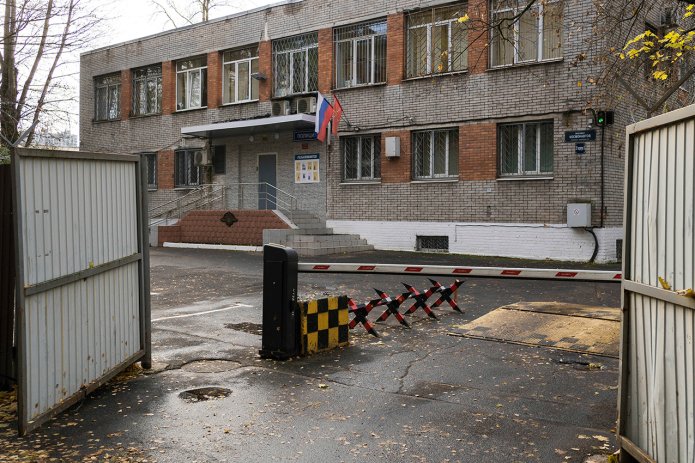
Levicheva was immediately taken from the police precinct to the Moskovsky District Court. Police officers later explained this urgency by the fact that she was being charged under «an article that causes a public outcry». It still concerned discrediting the army: the police would remember the «booby-trapped» maternity hospital only a year later, at the trial where Tatyana was suing them. The court hearing was postponed to June 10, and Levicheva was allowed to go home.
Among the evidence that the police eventually presented to the court was an expert report testifying that Levicheva’s fingerprints matched those taken from the posters in the park. But Judge Lezhakova of the Moskovsky District Court took into account that the forensic expert had not been warned «about his [legal] responsibility in the event of knowingly providing a false conclusion». Law enforcement officers also did not present video from the scene at the hearing (although they mentioned it in one of the references), and the rest of their evidence was, in the eyes of the court, no more than Levicheva’s «personality traits». Levicheva herself claimed that she was at home on May 9. In the end, the judge ruled that Levicheva’s guilt had not been proven. Like her colleagues from the Vyborgsky court, she dismissed the case due to insufficient evidence.
Tatyana, for her part, decided to sue police officers from both the 33rd and 36th police precincts. The idea was suggested by lawyer Sergei Podolsky, who cooperates with OVD-Info. «I didn’t even know I could do it. And when I found out, I was happy,» said Levicheva.
Tatyana Levicheva’s administrative lawsuit was first considered by the Moskovsky District Court. She asked for her detention to be recognised as unlawful and to recover the cost of her court fees from the defendants. At the end of April 2023, Judge Burdanova ruled against her. Tatyana appealed the decision at the city court, and her appeal is still under consideration.
The second lawsuit — in the Vyborgsky District Court — was under consideration for almost ten months. In addition to her request to recognise the actions of the police officers from the 36th precinct as illegal, Levicheva demanded compensation for damages: 500 thousand rubles (~5,590 US$) each from the Ministry of Internal Affairs and the Ministry of Finance. Lawyer Sergei Podolsky explains that in claiming the amount of one million rubles (~11,180US$), he «based this on the ECHR practice» in similar cases. Specifically, he referred to Levicheva’s detention for more than three hours without a police report having been drawn up, the lack of food and a place to sleep, the use of handcuffs, the threats of physical violence from Junior Lieutenant Medvedev, and so on.
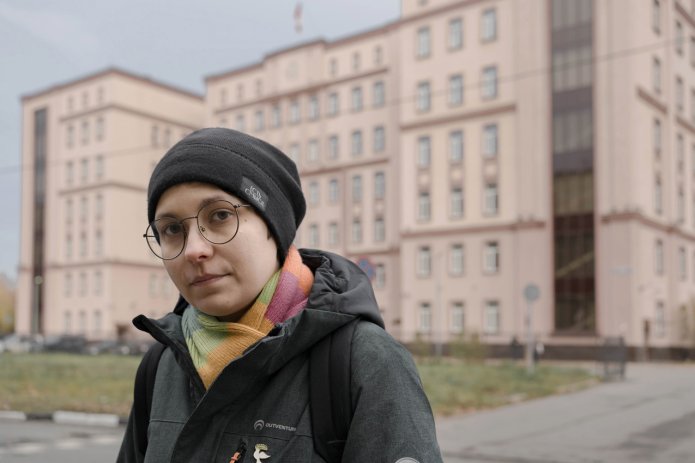
Claustrophobia and Vegetarianism
On August 6, 2022 the St. Petersburg police hotline received a call from citizen B. The caller complained that his son had paid 10 thousand rubles (~ 120 US$) to police captain Rusakov so that Rusakov would not open a criminal case against him. After that call, citizen B. was contacted by Junior Lieutenant Arthur Medvedev, who came to B.’s house, brought him 10 thousand rubles and in return received a written statement that there were no police complaints against B.
In November 2022, Junior Lieutenant Medvedev was fired from the police after 14 years of service for «an act unbecoming a law enforcement officer». (OVD-Info has a copy of the order for his dismissal.) So Medvedev did not attend any of the seven court hearings of Tatyana Levicheva’s lawsuit against the 36th Police Precinct. «Summonses were sent to his last known addresses, but he couldn’t be found,» says Sergei Podolsky.
What happened to the other defendant — Roman Romanov, head of the 36th Police Precinct — is even more peculiar. At the end of 2022, he was arrested by criminal investigators on suspicion of organising prostitution (Article 241 of the Criminal Code). According to the investigation, he received money from brothels located in different parts of St. Petersburg. Police Lieutenant Colonel Romanov was taken to pre-trial detention and then placed under house arrest. In February he, like Medvedev, was fired from the police (OVD-Info has a copy of Romanov’s dismissal order). «So, a trial of my case is going on in the Vyborgsky district. And it turns out that our defendant is in custody under the authority of the Federal Penitentiary Service. And the judge doesn’t know how to notify him, because she has never had to deal with a situation like this before,» Tatyana laughs.
As a result, the defendants were replaced in court by secondary figures who, according to Sergei Podolsky, «made up fairy tales»: «That the head of the police precinct himself ordered food delivery for Tanya. No one knows where he ordered it to. That Tanya is claustrophobic, and that is why she wasn’t placed in a cell but was left on a chair instead. That she is a vegetarian, so she could not be given regular food.» The latter statement astonished the plaintiff so much that she nearly offered to demonstrate that it wasn’t true by eating a steak right in front of the judge’s eyes. Tatyana says that she is neither claustrophobic nor a vegetarian. The claim that the food was ordered for her is also a lie.
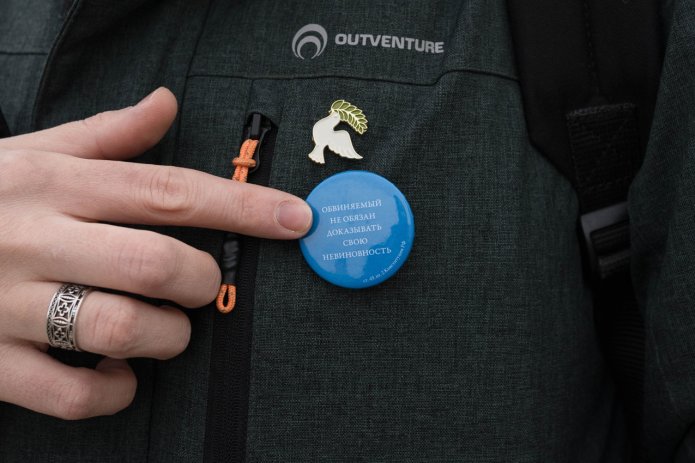
On September 14, Judge Minina partially ruled in favour of Levicheva, declaring the failure of the police to provide food, water, and a place to sleep illegal. She considered 2,000 rubles (~ 22 US$) to be sufficient compensation. The full text of the judgement is not available yet, but Tatyana is planning to appeal anyway. «With this kind of decision, the court just boosts police impunity, encouraging police officers to do whatever they want,» complains Tatyana’s attorney Sergei Podolsky.
When asked if it makes any sense to sue the system in its current state, Podolsky replies: «Well, one could also do nothing, throw up one’s hands and say everything is bad. All the same, we are trying to bend the system towards rule of law. Because when the law is blatantly violated, something must be done about it.»
Galya Sova



